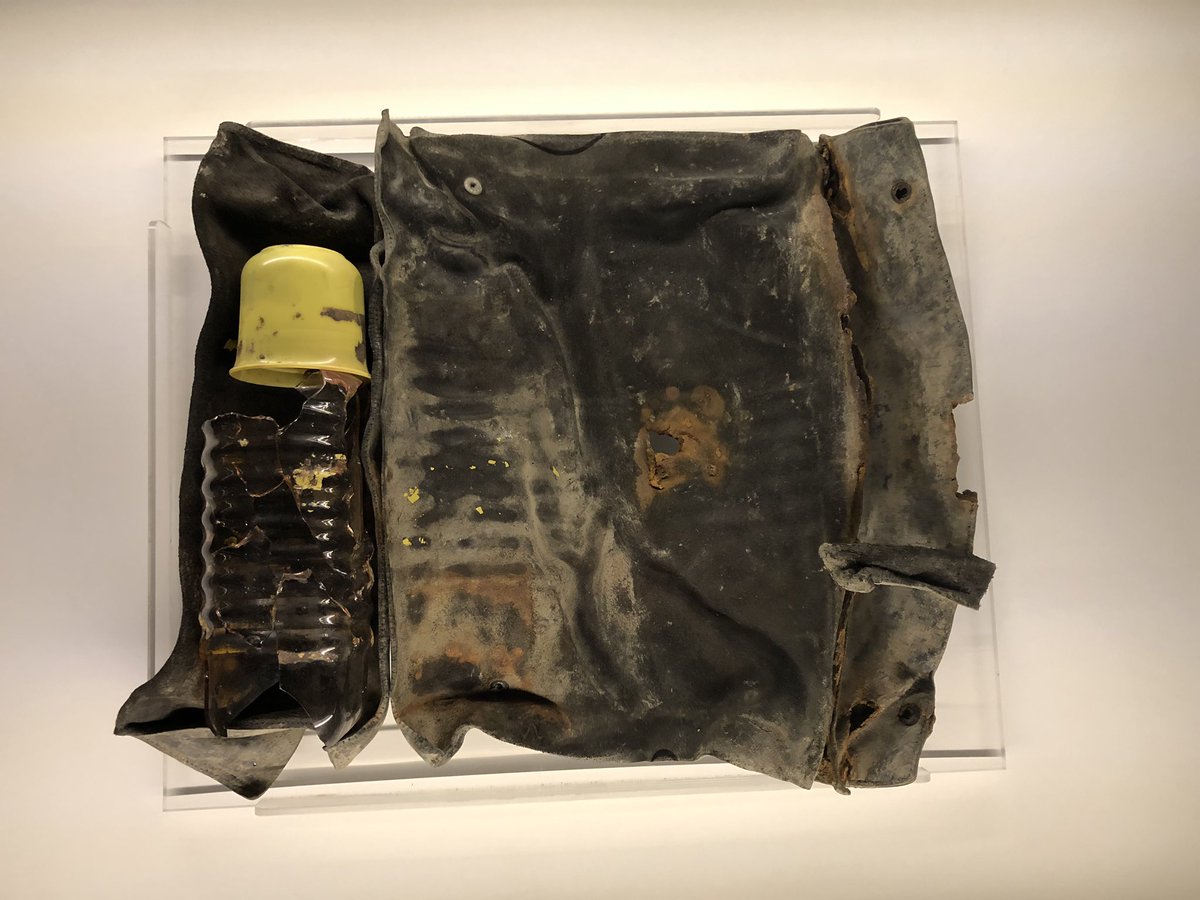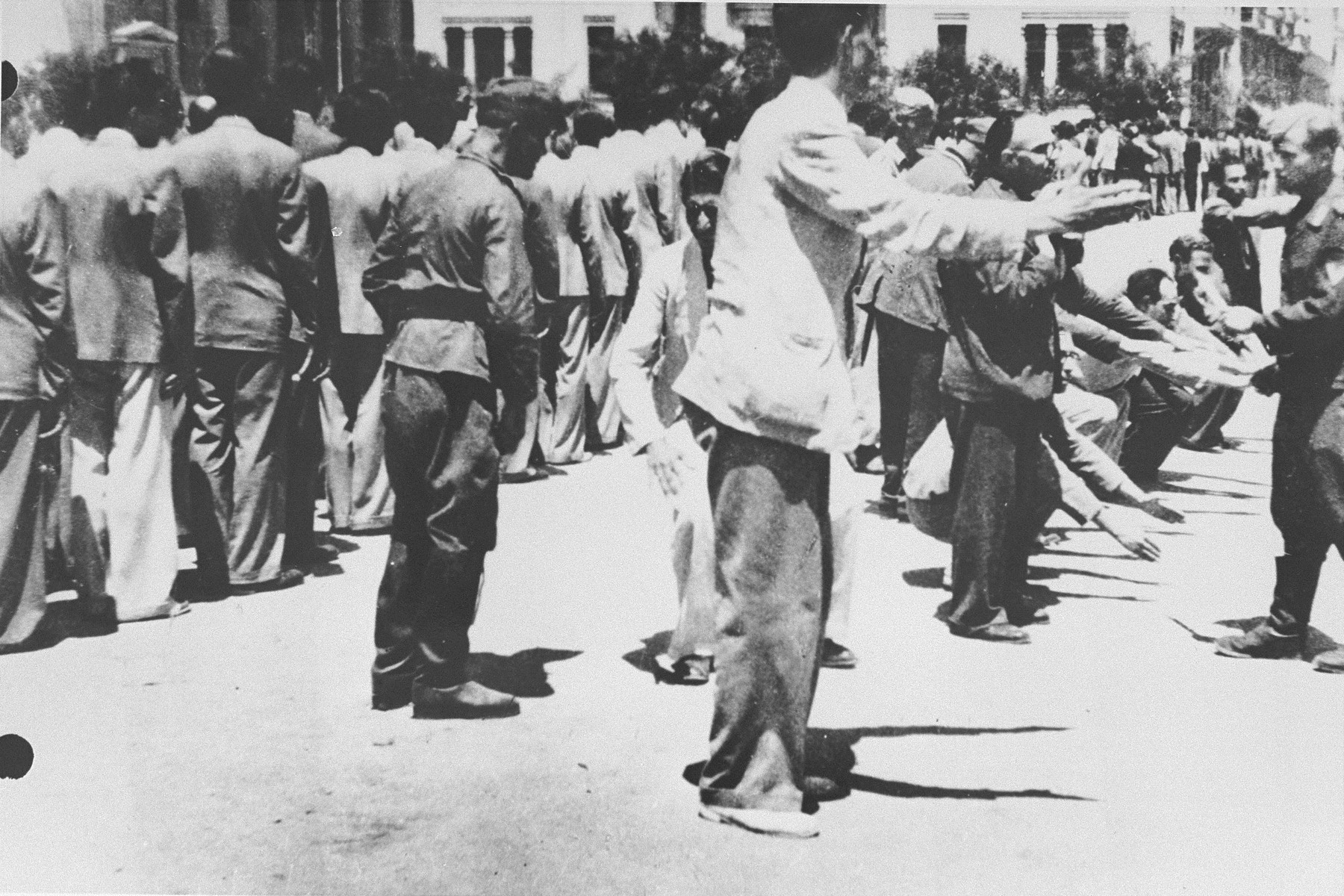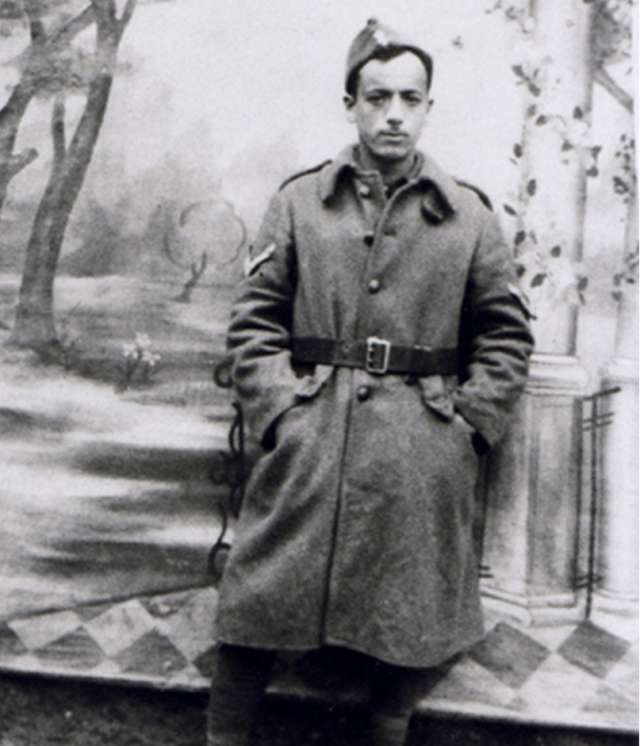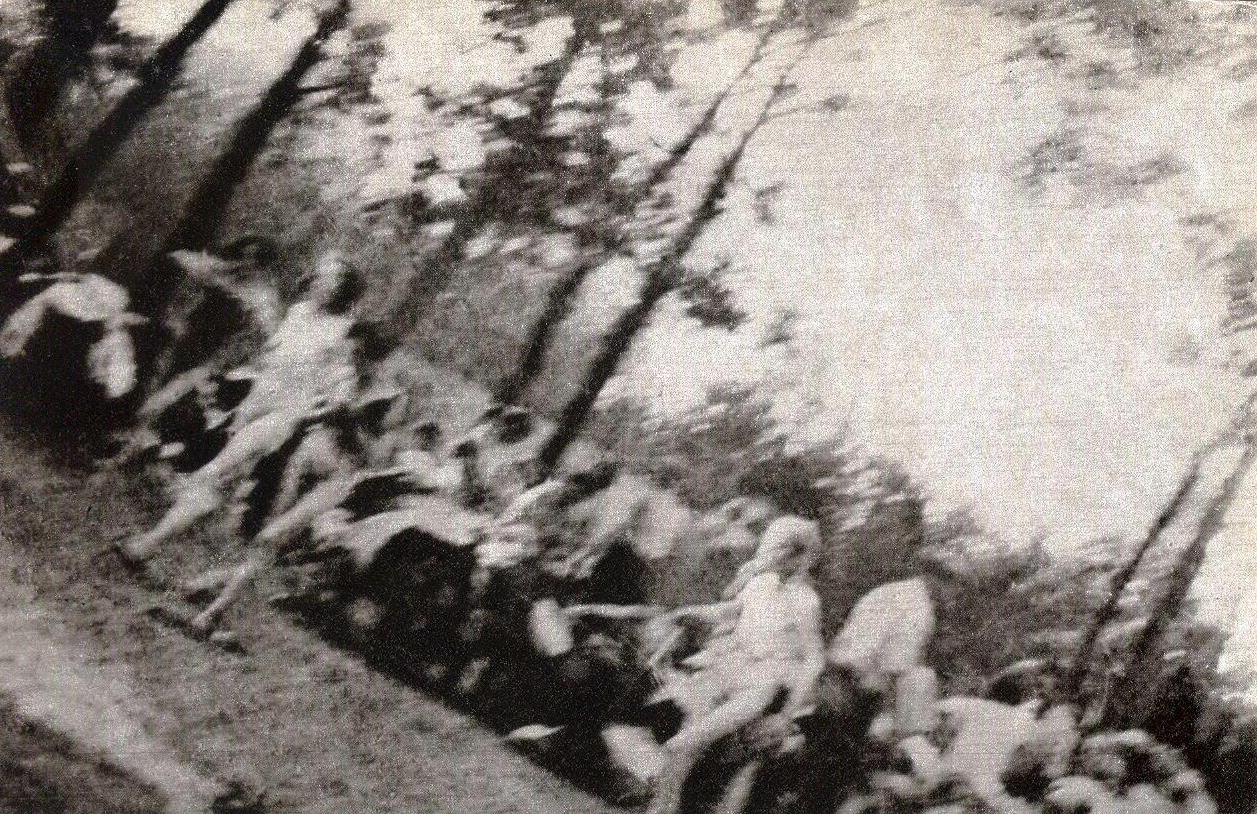
Marcel Nadjari’s mother father and sister Nelli were all murdered by the Nazis at the Auschwitz-Birkenau camp during The Holocaust. At age 26, Marcel, a Greek Jew from Thessaloniki, was in the death camp, put to work as one of the Sonderkommando – enslaved Jews ordered to escort Jews to the gas chambers, retrieve the bodies, collect gold fillings and women’s hair, and toss the ashes into the river. “Thus they eliminate all traces,” wrote Nadjary.
“Often I thought of going in with the others, to put an end to this,” he wrote in November 1944. “But always revenge prevented me doing so. I wanted and want to live, to avenge the death of Dad, Mum and my dear little sister.” So he wrote something that maybe would outlive him and tell the world he’d existed and what he’d witnessed. His words ran to 13-pages, with an introduction in German, Polish and French asking that whoever found the manuscript pass it to the Greek embassy for forwarding to his friend Dimitrios Stefanides.
He stuffed the papers inside a thermos flask and buried it near Crematorium III. So much is said about The Holocaust. But as years, pass, the danger is that we brush it away, becoming indifferent to the destruction of man and start to forget. The most cruel will deny and damn the murdered millions as liars. With no voices to tell the truth and keep on telling it, the victims of Nazi depravity will be killed again. Marcel Nadjari’s papers invite us to remember. They bare witness. The victims should not be “reduced to silence”, as Primo Levi wrote in his autobiographical story of life in the Auschwitz extermination camp.

German soldiers force a group of Jews to perform calisthenics on Eleftheria (Freedom) Square in Salonika – 1942 July 11
– United States Holocaust Memorial Museum

Marcel Nadjary
This extract from one manuscript was reprinted in We Wept Without Tears, an account of the Auschwitz Sonderkommando:
“The crematorium is a big building with a wide chimney and 15 ovens. Under a garden there are two enormous cellars. One is where people undress and the other is the death chamber. People enter it naked and once about 3,000 are inside it is locked and they are gassed. After six or seven minutes of suffering they die.
“The gas canisters were always delivered in a German Red Cross vehicle with two SS men. They then dropped the gas through openings – and half an hour later our work began. We dragged the bodies of those innocent women and children to the lift, which took them to the ovens.
“We must disappear from the face of the earth, because we know so much about the unimaginable methods of their abuses and reprisals,” wrote Nadjary, instructing his friends “whenever someone asks after me, simply say that I no longer exist.
“Almost always, when they kill, I ask myself if God exists, and nevertheless, I have always believed in Him.
“About 600,000 Jews from Hungary have passed by my eyes…
“You will certainly think that the great destruction of our people was the result of war. You will think that the complete elimination of the People of Israel in Europe was caused by a natural disaster.”

Above and below: The Sonderkommando photographs are four blurred photographs taken secretly in August 1944 inside the Auschwitz concentration camp in German-occupied Poland. Along with a few photographs in the Auschwitz Album, they are the only ones known to exist of events around the gas chambers. The images were taken within 15–30 minutes of each other by an inmate inside Auschwitz-Birkenau, the extermination camp within the Auschwitz complex. Usually named only as Alex, a Jewish prisoner from Greece, the photographer was a member of the Sonderkommando, inmates forced to work in and around the gas chambers. Several sources identified him as Alberto Errera, a Greek naval officer. He took two shots from inside one of the gas chambers and two outside, shooting from the hip, unable to aim the camera with any precision. The Polish resistance smuggled the film out of the camp in a toothpaste tube

Translation of the following letter was graciously completed by the German-Canadian Centre for Innovation and Research, an Edmonton-based not-for-profit devoted to forging academic, business and industrial links between Canada, France and Germany.
The text is an English translation of the German translation of the original Greek. The German text was sourced from Das Ungelesene lesen (Read the Unread) by Russian historian Pavel Polian, published in Vierteljahrshefte für Zeitgeschichte (Contemporary History Quarterly). Any errors from the original manuscript have been retained.
The letter opens with requests in German, Polish and French for the reader to immediately deliver the package to the nearest Greek consulate.
Please send this
letter to the
nearest Greek
ConsulateI request that the enclosed
letter be delivered to the next
Greek Consul.[…] ces quelques mots
par[s?] un condamne [?] a mort […]
[…] le remettre en plus prochain
Consulat de la GreceDimitrios A. Stefanides
Rue Kroussovo No 4
Thessaloniki
GRECETo my dear Dimitris Athan.[asius] Stefanidis, Ilias Koen,- Georgios Gounaris.
To my beloved companion, Smaro Efraimidou and so many more, of whom I will always think, and finally, to my beloved fatherland: “ELLAS,” to whom I was always a good citizen. –On April, 1944 we were transported from our Athens, after I suffered through a month in the camp Chaidari where I always [word crossed out] received good Smaro’s packages, and his efforts on my behalf remain unforgettable in these terrible days I am going through. …always, that you … search … for her.
Dear Misko and at sometime … get her address for me … our Ilias and that you always look after him … and that Manolis (an alias Nadjary used for himself) has not forgotten them.But also that it looks like we will unfortunately not see one another again. –
After a journey of ten days we arrived at Auschwitz on April 11 where they brought us to the camp Birkenau, we stayed approximately one month in quarantine and from there they relocated us, both the healthy and the sick. Where? Where, dear Misko? To a crematorium, I will explain for you below our lovely work that the Almighty wanted to have us perform. –
It is a large building with a wide chimney with 15 ovens. Underneath a garden there are two huge endless cellars. The one serves as a place to undress and the other as a death chamber, where the people enter naked and after the room is filled with approximately 3000 people, it is locked and they are gassed, where they breathe their last after 6 to 7 minutes of martyrdom. Our work consisted of first receiving them; most did not know the reason … breaking down or sobbing they were told that … this was for a bath … and they went to their deaths suspecting nothing. –
Until today… I said that each … (fragments of words that cannot be deciphered) … I said to them, that I didn’t understand the language in which they spoke to me, and to those people, men and women, where I could see that their fate was sealed, I told the truth. –
After … all naked, they went further into the death chamber in which the Germans had affixed pipes on the ceiling … so they would believe, that the bath was being prepared, with whips in their hands the Germans drove them closer and closer together, so that the largest number possible would fit, a real sardine tin of people, after which they hermetically sealed the door. The boxes of gas always came in cars from the German Red Cross with two SS people … It was the gas people that then poured the gas through the openings. –
After a half hour we opened the doors and our work began. We carried the corpses of these innocent women and children to the elevator, which transported them to the room with the ovens, and there they put them in the ovens, where they burnt without the aid of fuel because of the fat that they had. –
A person produced only about half an okka (640 grams) of ashes, bones that the Germans forced us to crush, to then press through a coarse sieve, and then a car picked it up and poured it into the Vistula River (actually the River Sola), which flows by in the area and thus they eliminate all traces. –
The dramas my eyes have seen are indescribable. About 600 000 Jews from Hungary have passed by my eyes, – French – Poles from Litzmannstadt, roughly 80 000, and now most recently about 10 000 Jews from Theresienstadt in Czechoslovakia arrived. –
Today a transport came from Theresienstadt, but thank God they were not brought to us, they kept them in camps, which means that the order was given not to kill any more Jews, and that appears to be the case, they changed their minds at the last moment – now that there isn’t a single Jew left in Europe, but for us things are different, we must disappear from the face of the earth, because we know so much about the unimaginable methods of their abuses and reprisals. –
Our unit is called the special unit, it included at the beginning about 1000 people, of these 200 Greeks and the rest Poles and Hungarians, and after heroic resistance, because they wanted to only remove 800, because all one hundred outside of the camp and the others inside. My good friends Viko Brudo and Minis Aaron from Thess/niki were killed in action. They will eliminate us too, now that this command has been given, we are 26 Greeks overall and the remaining ones are Polish. At least we Greeks are determined to die like true Greeks, just like every Greek knows how to leave life, by showing until the very last moment, despite the dominance of the criminals, that Greek blood is flowing through our veins, like we have also shown in the war against Italy
My dearests, when you are reading what work I have done, you will say: how could I, Manolis, or anybody else, do this work and burn fellow believers. At the beginning I told myself the same thing, many times, I thought about joining them, in order to end everything. However, the thing that kept me from doing so was revenge; I wanted and I want to live, to revenge the deaths of Dad and Mum, and that of my beloved little sister Nelli.
I am not afraid of dying, after all, how could I fear it, after everything that my eyes have seen? Because of this, dear Ilias, my beloved little cousin, you, and all my friends, should know your duty, once I am no longer. From my little cousin Sarrika Chouli you remember her, the small one that was at my house back then? Who still lives, I learned, that Nellika was together with your little sister Errika, until their very last moment. My only wish is that what I am writing reaches your hands. My family’s property, I leave for you, Misko, with the request that you will take in Ilias, my cousin. Ilias is a Koen and you should view him as if he were myself, you should always look out for him, and in case my cousin Sarika Chouli comes back, you should treat her, dear Misko, like your beloved niece Smaragda, since here we are all experiencing things that the human mind isn’t able to imagine. –
Remember me from time to time, like I am remembering you. –
Fate doesn’t want me to see our Greece as a free man, as I experienced it on 12.10.43. Whenever someone asks after me, simply say that I no longer exist, and that I have gone as a true Greek. –
Help all those, dear Miskos, who come back from the Birkenau camp. –
I am not sad, dear Misko, that I will die, but that I won’t be able to avenge myself the way I would like to. If you receive a letter from my relatives abroad, please give the fitting answer that the family A. Nadjari is annihilated, killed off by the cultivated Germans, do you remember, dear Giorgos? Please pick up, Misko, the piano of my Nelli from the Sionidou family and give it to Ilias, so that he always has it with him in commemoration, he loved her so much and she loved him, too. –
Almost always, when they kill, I ask myself, if God exists, and nevertheless, I have always believed in Him and I still believe, that God wants His will to be done. I’m dying happy, because I know that at this moment our Greece is free. My last words will be: Long live Greece.
Marcel Nadjari
For about four years now they have been killing the Jews … they killed Poles, Czechs, French, Hungarians, Slovaks, Dutch, Belgians, Russians und all Thess/nikis, except the 300 who are still alive today, (in) Athens, Arta, Kerkyra (Corfu), Kos and Rhodes. –A total of around 1,400,000
The honored Greek Embassy which will receive this note is asked by a good Greek citizen called Emmanouil or Marcel Nadjari from Thess/niki, previously resident in Odos Italias No. 9 in Thess/niki, to send this note to the following address.
Dimitrios Athanassiou Stefanidis
Odos Krousovou No. 4
Thess/niki
GreeceThis is my last wish. Condemned to death by the Germans because I am Jewish.
Thank you.
Nadjaris
In 1980, a Polish forestry student spotted the thermos during a dig. The Auschwitz Museum sent the papers to the aforementioned Pavel Polian, who set about deciphering the faded message. Only around 10% of the message remained legible. Aided by Russian IT expert Alexander Nikityaev and Ioannis Carras, a Greek-British scholar living in Freiburg, Germany, and technology we can now read Marcel’s message.
The Writer:
Marcel Nadjari did not die at Auschwitz. He was sent to the Mauthausen concentration camp in Austria as the Third Reich retreated. He did not die there, either. He married Rosa Saltiel, a fellow survivor, and in 1951 moved to New York, finding work as a tailor. In 1957 they had a daughter. They named her Nelli after Marcel’s sister. Nadjari died in 1971. Marcel Nadjari – born 1st January 1917 in Thessaloniki, Greece – died 31 july 1971 in New York, New York.)
Salonika’s 54,000 Jews were shipped to the Nazi extermination camps. More than 90% of the total Jewish population of the city were murdered during the war.
Via: National Post
Would you like to support Flashbak?
Please consider making a donation to our site. We don't want to rely on ads to bring you the best of visual culture. You can also support us by signing up to our Mailing List. And you can also follow us on Facebook, Instagram and Twitter. For great art and culture delivered to your door, visit our shop.

